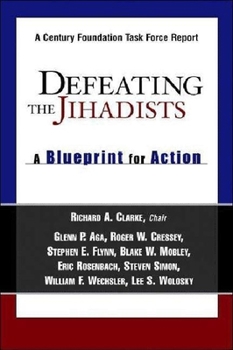Defeating the Jihadists: A Blueprint for Action
Select Format
Select Condition 
Book Overview
It is imperative that we implement effective policies that address the causes, conditions, and misunderstandings that have brought the world to the current impasse. The Century Foundation's Defeating the Jihadists: A Blueprint for Action builds on the findings of the 9/11 Commission and provides a detailed plan for creating a more secure world. It is essential reading. -- Bob Kerrey, president, New School University Defeating the Jihadists: A Blueprint for Action, the report of a task force assembled and chaired by Richard A. Clarke, assesses the nation's successes and failures in fighting terrorism and provides a detailed action plan for neutralizing the international movement at the core of worldwide terrorism. Central to these plans are the group's proposals for significant changes in U.S. policy toward key Muslim countries. The report also describes the nature of the jihadist threat; provides comprehensive profiles of the various groups; and offers a rationale for the effort and money that would be needed to make the plan a success. Key strategies covered in depth include: focus on winning the Battle of Ideas; invest in education and development in Islamic nations; implement tailored strategies for key countries, particularly Iran, Pakistan, Saudi Arabia, Egypt, and Iraq; defuse sources of Islamic hatred for the United States; improve U.S. intelligence and law enforcement organization; reinvigorate efforts to combat terrorist financing; improve U.S. military organization; and accelerate security investments for ports, trains, and chemical plants.
Format:Paperback
Language:English
ISBN:0870784919
ISBN13:9780870784910
Release Date:November 2004
Publisher:Century Foundation Press
Length:172 Pages
Weight:0.69 lbs.
Dimensions:0.5" x 6.1" x 9.0"
Customer Reviews
1 rating
Another Must-Read
Published by Thriftbooks.com User , 20 years ago
Like the 9/11 Commission Report and books such as Imperial Hubris, Defeating the Jihadists is another must-read for anyone wants to better understand the threat a terrorism and just how our government may be mishandling the entire situation. Two chapters in particular stood out for me: Chapter 4: A Country-by-Country Approach and Chapter 5: Partnering with the Islamic World. Chapters 4 lays out in detail the conditions in five nations (Saudi Arabia, Egypt, Iran, Pakistan and Iraq) in which terrorists, or as the authors call them "jihadists," are seeking to replace existing governments or have already succeeded in installing a fundamentalist regime. Of particular importance, I think, is the discussion of Pakistan (a nuclear country) and the failed policy in Iraq. Chapter 5 discusses how we can partner with Islamic countries to promote ideas like democracy, civil liberties, nonviolence, and protection of noncombatants. This is a dry volume, but that doesn't reduce its importance. Every library in America should have a copy of this book.





